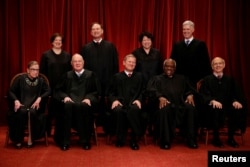The Supreme Court of the United States ended its term this month with a striking, almost dramatic finish.
In recent days, the court announced major decisions that relate to immigration, labor unions and a woman’s right to end her pregnancy. It also ruled on tensions between gay rights and opponents of same-sex marriage.
Then, one of the nine justices, Anthony Kennedy, announced he is retiring.
Kennedy is 81 years old, and the second-oldest person on the high court. Some court watchers call him the “swing voter” because they have a hard time predicting how he will vote in cases. His decision to retire, and the person who replaces him, will affect Supreme Court decisions far into the future.
In the U.S., the president nominates someone to fill an open seat on the nine-member court. Then a Senate committee holds hearings on the nomination. If committee members vote to approve the nominee, the nomination goes to the full Senate.
Once approved, Supreme Court justices can serve in the position for the rest of their lives.
Kennedy’s retirement gives President Donald Trump the chance to nominate someone who is likely to appeal to members of his Republican Party. Trump nominated such a candidate in 2017, following the death of Justice Antonin Scalia in early 2016. Scalia died during the presidency of Barack Obama, a Democrat. Although Obama was president at the time, Republican leaders in Congress refused to hold hearings on the person he nominated. Now, however, a top Republican lawmaker said the Senate “stands ready” to move quickly on hearings for Kennedy’s replacement.
A narrow majority
The importance of who sits on the Supreme Court has been clear in recent decisions. A narrow majority of five justices, including Kennedy, ruled that Trump’s travel ban on people from some majority-Muslim nations is legal.
The same narrow majority struck down a rule requiring all public workers to give financial support to labor unions.
In another decision, five members of the court ruled that “crisis pregnancy centers” did not have to tell women the state offered free and legal abortion services.
And a larger, 7-2 majority ruled in the case of a Christian baker in Colorado. They said he did not violate the law by refusing to make a wedding cake for a same-sex couple. Kennedy added that state officials had not treated the baker’s religious objections respectfully.
Supreme Court justices aim to be independent interpreters of the Constitution and not politicians. However, a reporter for the Associated Press notes that Americans who approve of the recent Supreme Court decisions may also support Trump and other Republican candidates in the next elections.
Reporter Jonathan Lemire noted they may do so in order to ensure another conservative-minded justice is added to the court. Lemire noted that, “Trump himself took the unusual step of publicly releasing a list of Supreme Court candidates, most of whom were traditional jurists that many Republicans believed would uphold conservative values.”
I’m Kelly Jean Kelly.
________________________________________________________________
Words in This Story
dramatic - adj. attracting attention : causing people to carefully listen and look
gay - adj. of, relating to, or used by homosexuals
abortion - n. a medical procedure used to end a pregnancy and cause the death of the fetus
baker - n. someone who bakes bread, cakes, etc.
cake - n. a sweet baked food made from a mixture of flour, sugar, and other ingredients (such as eggs and butter)
couple - n. two people who are married or who have a romantic or sexual relationship
interpreter - n. a person who explains the meaning of something






